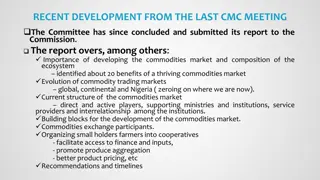The Role of the State and Market in Development I
This session, led by Dr. Maame Adwoa A. Gyekye-Jandoh, explores the debate on the role of the state versus the market in development. It discusses development planning, arguments for and against state intervention in the economy, and key concepts related to economic decision-making and coordination. The session highlights the complexities of achieving development objectives and the considerations involved in determining the level of state involvement in economic activities.
Download Presentation

Please find below an Image/Link to download the presentation.
The content on the website is provided AS IS for your information and personal use only. It may not be sold, licensed, or shared on other websites without obtaining consent from the author.If you encounter any issues during the download, it is possible that the publisher has removed the file from their server.
You are allowed to download the files provided on this website for personal or commercial use, subject to the condition that they are used lawfully. All files are the property of their respective owners.
The content on the website is provided AS IS for your information and personal use only. It may not be sold, licensed, or shared on other websites without obtaining consent from the author.
E N D
Presentation Transcript
THE ROLE OF THE STATE AND MARKET IN DEVELOPMENT I Lecturer: Dr. Maame Adwoa A. Gyekye-Jandoh Contact Information: mgyekyej@yahoo.com College of Education School of Continuing and Distance Education 2014/2015 2016/2017
Session Overview Overview This session discusses the role of the state in development. In the previous session, the role of outside actors and their policies in conjunction with the government/state in seeking to promote development was considered. This session considers the state s role per se (through the government running it) in development. Should the state intervene or play a large role in the economy? Should markets have more of a role in the economy and development than the state? These are some questions this session will address. Slide 2
Session Outline The key topics to be covered in this session are as follows: Topic One: Development Planning and the Role of the State Topic Two: Arguments in Favor of Development Planning in Developing Countries Topic Three: Arguments against Development Planning in Developing Countries Slide 3
Reading List Todaro, Michael. 2000. Economic Development. England: Pearson Education Limited. Michael Todaro and Stephen Smith (2012). Development Policymaking and the Roles of Market, State, and Civil Society. p. 511-516; 524-533 Slide 4
Topic One DEVELOPMENT PLANNING AND THE ROLE OF THE STATE Slide 5
Development Planning and the Role of the State Development Planning: What is it? Development planning, sometimes known also as economic planning, according to (Todaro 2000: 622) involves a deliberate governmental attempt to coordinate economic decision making over the long run and to influence, direct, and in some cases even control the level and growth of a nation s principal economic variables such as income, consumption, employment, investment, saving, exports, and imports in order to achieve a predetermined set of development objectives. The planning process is an exercise where government first chooses social objectives, sets various targets, and finally organizes a framework for implementing, coordinating, and monitoring a development plan. Development plans may be either comprehensive or partial. A comprehensive development plan sets its targets to cover all aspects of the national economy. Slide 6
Development Plans A partial plan covers only a part of the national economy industry, agriculture, the public sector, the foreign sector, and others. Most development plans have been drawn up and carried out within the framework of the mixed economies of developing countries. Note that mixed developing economies like Ghana are characterized by the existence of an institutional setting in which some of the productive resources are privately owned and operated and some are controlled by the public sector (Todaro 2000: 623) Slide 7
The Nature and Relevance of Development Planning in Mixed Developing Economies The Nature and Relevance of Development Planning in Mixed Developing Economies Development planning came to be accepted as an essential means of guiding and increasing economic growth in most developing countries. In mixed developing economies, two principal components of development planning can be identified: 1. The state or government plays a role in economic development through its deliberate use of domestic saving and foreign finance to carry out public investment projects and to mobilize scarce resources into areas that can be expected to make the most contribution toward the realization of long-term economic objectives (for example, the construction of schools, railways, hydroelectric projects, and other components of economic infrastructure, in addition to the creation of import-substituting industries). Slide 8
The Nature and Relevance of Development Planning 2. The government puts in place economic policy (such as taxation, industrial licensing, tariffs, and the manipulation of quotas, wages, interest rates, and prices) to stimulate, direct, and in some cases even control private economic activity in order to ensure a harmonious relationship between the desires of private business and the social objectives of the central government. The compromise nature of development planning in mixed developing economies/countries between the extremes of market operation and the control of the central government becomes evident. Slide 9
Sample Questions Define Development Planning, distinguishing between the two types of development plans. Explain the nature of development planning in mixed developing economies. Slide 10
Topic Two ARGUMENTS IN FAVOUR OF DEVELOPMENT PLANNING IN DEVELOPING COUNTRIES Slide 11
Arguments in Favour of Development Planning in Developing Countries Major Reasons or Arguments for the Adoption of Development Planning in Developing Economies The widespread acceptance of economic planning as a development tool was due to a number of fundamental economic and institutional arguments (Todaro 2000: 624). Here are four major arguments. 1. Market Failure. It is argued that markets in less developed countries (LDCs) tend to be characterized by structural and operational imperfections. For example, prices are often distorted. The real cost to developing societies of goods, services, and resources, is often difficult to measure. Therefore it is argued that governments have an important role to play in integrating markets and modifying prices, because of the failure of the market to price factors of production correctly. Slide 12
Arguments in Favour of Development Planning in Developing Countries (DCs) The market is said to lead to a misallocation of present and future resources or to an allocation that may not in the long-run be best for societal interests. As Todaro (2000) highlights further, this market failure argument is perhaps the reason given most often for the expanded role of government/state in the LDCs. 2. Resource Mobilization and Allocation. It has been argued that developing economies cannot afford to waste their very limited skilled human resources on unproductive ventures. Thus it is best to employ skilled workers where their contribution will be most widely felt. Development planning can supposedly help modify the effects of limited resources in developing economies by recognizing that particular constraints or limitations exist and by choosing and coordinating investment projects so that scarce factors would be used most productively. Slide 13
More Arguments in Favour of Development Planning in DCs 3. Psychological or Attitudinal Impact. It is argued here that a specific development plan, which is a detailed statement of national economic and social objectives, can have an important psychological or attitudinal impact on a divided population. The governments of LDCs may be able to rally their people behind them in a national campaign to get rid of poverty, ignorance, and disease. By mobilizing popular support with a call to all citizens to work together to build the nation, it is argued that an enlightened government/state can best provide the necessary incentives to overcome the divisive forces of ethnic sectionalism, race, class, or religion, in a common quest for widespread social and material progress. Slide 14
More Arguments in Favour of Development Planning in DCs 4. Foreign Aid. Bilateral and multilateral foreign aid have often had certain conditions attached, one of which is the crafting of detailed development plans with specific output targets for different sectors and carefully designed investment projects. Some in fact argue that the real reason why LDCs come up with development plans is in order to receive more foreign aid. LDCs believe that they will be able to persuade donors to part with funds if they have a comprehensive list of projects couched within a well- conceived and internally consistent development plan. Slide 15
The Importance of Development Planning Thus, centralized national planning in the form of development plans was widely believed to offer the essential and perhaps the only institutional and organizational means for overcoming the major obstacles to development and ensuring a high rate of economic growth that is sustainable. This gave the state/government of the LDCs an important role to play in development. Unfortunately, there was plan failure over time in many of the LDCs. Several reasons have been given for this. Question: Research and explain the reasons for plan failures in LDCs stated below. Slide 16
Reasons for the Failure of Development Plans in DCs Reasons for Development Plan Failures in Many DCs: 1. deficiencies in plans and their implementation 2. insufficient and unreliable data 3. unanticipated external and internal disturbances 4. institutional weaknesses 5. lack of political will Slide 17
Topic Three ARGUMENTS AGAINST DEVELOPMENT PLANNING IN DEVELOPING COUNTRIES Slide 18
Arguments Against Development Planning in Developing Countries As a result of the perceived failure of state/government planning and intervention, a growing number of economists (mostly Western), some LDC finance ministers, and heads of major international development organizations like World Bank and IMF began to advocate the increased use of the market mechanism as key to promoting economic growth, development, and greater efficiency. The decade of the 1970s witnessed a period of increased public sector governmental activity in the pursuit of development, while the 1980s and 1990s witnessed the reemergence of free-market economics as part of the ever-changing ideas regarding development issues. Slide 19
Arguments Against Development Planning in Developing Countries (DCs) Here are a few arguments made against development planning and government intervention in developing countries. 1. Individuals may know more about their own preferences and circumstances than the government. 2. Government planning may increase risk because governments may make bigger mistakes than markets. 3. Development planning may be more rigid and inflexible than private action because of the complex decision-making machinery that characterizes most governments. 4. Governments may not be capable of administering detailed plans. 5. Bureaucratic obstacles and government controls may hinder private sector individual initiative that can contribute to development. Slide 20
More Arguments Against Development Planning in DCs 6. Finally, public enterprises are often wasteful and inefficient. It is argued that the discipline and rewards of the market cannot be easily duplicated in public or governmental organizations; individuals and organizations require incentives to work, innovate, control costs and efficiently allocate resources, which markets do better (Todaro 2000: 641; adapted from Nicholas Stern, September 1989, The Economics of Development: A Survey, Economic Journal 99, tab 4). Slide 21
Additional Arguments about Development Planning Despite these arguments, you must remember that judgments about the advantages of public/state versus private/market economic activities and vice versa can only be made in the context of specific countries and their concrete situations. Some socio-cultural preconditions and economic practices must be met if there is to be a successful use of the market for development. Question: Make a case either for or against development planning in LDCs, giving at least three reasons. Slide 22
Conclusion of Session 9 In this session, the role of the state in development, through development planning, has been discussed, including the definition of development planning. We have looked at major arguments for the adoption of development planning in developing economies and the relevance of development planning, considered as the solution to the poor standard of living and conditions in developing nations. In addition, some reasons for the failure of development plans in many LDCs have been highlighted. You have also become familiar with a few key arguments against development planning made by scholars and development practitioners alike. In Session 10, we will examine the market as an alternative to development planning and state intervention. Slide 23
References Todaro, Michael. 2000. Economic Development. England: Pearson Education Limited. Michael Todaro and Stephen Smith (2012). Development Policymaking and the Roles of Market, State, and Civil Society. p. 511-516; 524- 533 Slide 24






























